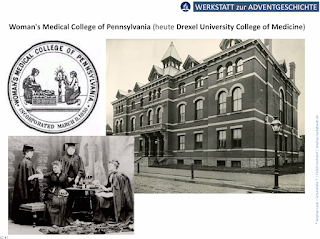Tell Her Story
In preparation for
Women’s History Month, I have looked for women who have made an impact in my
church in past times. History has mostly ignored women’s contributions. Jesus,
however, was aware that history should and would be told, and he said about the
woman who had anointed his feet, “Wherever the gospel is preached throughout
the world, what she has done will also be told, in memory of her” (Mark 14:8+9
NIV). It is important to tell the stories of women.
I have just ordered
the book “Tell Her Story: How Women Led, Taught, and Ministered in the Early
Church” by Nijay Gupta which will be released tomorrow. I am very much looking
forward to learning more about the women of the Bible. The book description
says, “For centuries, discussions of early Christianity have focused on male
leaders. But there is ample evidence in the New Testament that women were
respected leaders at the frontier of the gospel ministry. Nijay Gupta shines
light on the inspiring contributions of women like Phoebe, Prisca, Junia,
Nympha, and more.”[1]
The foreword to the book was written by medieval historian Beth Allison
Barr, the author of the best-selling book “The Making of Biblical Womanhood.” She
describes how murals of the Annunciation by the Angel Gabriel to the Virgin
Mary, and the Visitation of Mary to Elizabeth in the parish church of St. Thomas and St. Edmund in Salisbury, painted
by medieval artists, had been whitewashed during the reformation, thus becoming
invisible until discovered hundreds of years later in 1819. It struck her how much women in the early
church have been treated like those medieval paintings in St. Thomas. She
writes, “Just like the Dome painting soaring about the nave in St. Thomas, women led
in the early church. The problem has never been their existence. The problem
has only been our ability to see them. This is the brilliance of Tell
Her Story. It does not tell a new story; it just helps us see the story as
it has always been. The modern restorations in the parish church of St. Thomas
and St. Edmund did not paint the scene of the Last Judgement or the visitation
between Mary and Elizabeth; the restorations only helped us see what the
medieval artist had already done.”[2]
More and more books about women are being published. Another book that I want
to read is “Femina: A New History of the Middle Ages, Through the Women Written
Out of It by Janina Ramirez. The following words are the official description of the book:
“A
groundbreaking reappraisal of medieval femininity, revealing why women have
been written out of history and why it matters. The Middle Ages are seen as a
bloodthirsty time of Vikings, saints, and kings; a patriarchal society that
oppressed and excluded women. But when we dig a little deeper into the truth,
we can see that the “Dark” Ages were anything but.
Oxford and BBC
historian Janina Ramirez has uncovered countless influential women’s names
struck out of historical records, with the word FEMINA annotated beside them.
As gatekeepers of the past ordered books to be burned, artworks to be
destroyed, and new versions of myths, legends, and historical documents to be
produced, our view of history has been manipulated.
Only now,
through a careful examination of the artifacts, writings, and possessions they
left behind, are the influential and multifaceted lives of women emerging.
Femina goes beyond the official records to uncover the true impact of women.”[3]
Even in my church, women whose traces were lost or hidden are being
rediscovered by historians doing painstaking research in archives. It is good
that we are finding out how women devoted themselves to spreading the gospel in
so many ways, giving their lives and sacrificing so much for their love for God
and humankind.
[1] https://www.amazon.de/Tell-Her-Story-Taught-Ministered/dp/1514000741/ref=sr_1_1?crid=E71BI71YWQUK&keywords=nijay+gupta&qid=1678701346&sprefix=nijay%2Caps%2C159&sr=8-1
[2] https://bethallisonbarr.substack.com/p/seeing-women-my-foreword-to-nijay?utm_source=facebook&sd=pf&fbclid=IwAR04cgT9FAnzoU1sRpz74C8l6fZ8Cj2UAwzbu32k_c8w4nHC7o8zj7q-wjU
[3] https://www.amazon.de/Femina-History-Through-Written-English-ebook/dp/B09YNX3M41/ref=sr_1_2?crid=2DSUH7SM609WI&keywords=femina+ramirez&qid=1678699082&sprefix=femina%2Caps%2C138&sr=8-2




Comments
Post a Comment